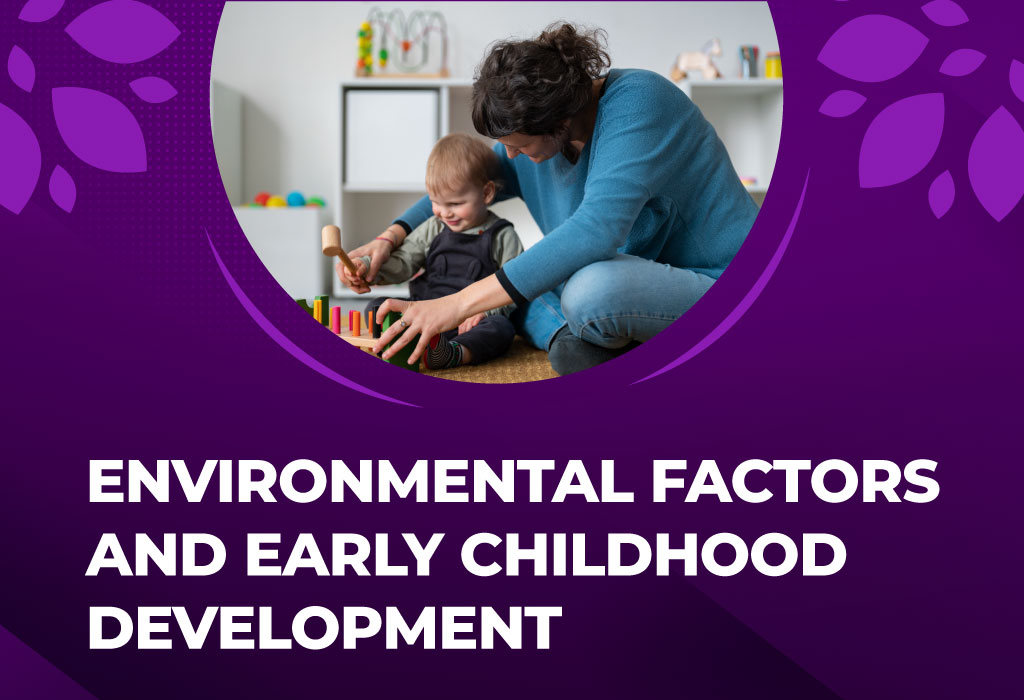Environmental Factors and Early Childhood Development

The early stages of a child’s life play an important role in determining their future health and development. From birth until age eight, children go through a period of rapid growth and development in a variety of dimensions including social, emotional, physical, and cognitive. In order to build supportive conditions that promote optimal growth, governments must have a thorough awareness of the environmental elements that influence this development. For instance, enrolling a child in a nurturing educational environment such as a Montessori school in Vedapatti can significantly impact their development positively. This blog analyzes the main environmental elements that have an impact on the development of young children and looks at ways to reduce negative effects while fostering favorable ones.
Physical Environment: Child development is greatly influenced by the physical environment, which includes things like access to green spaces, safety in the community, and housing circumstances. Children
have a higher chance of thriving when they live in tidy, secure, and engaging surroundings.
Housing Conditions: Adequate housing can have negative effects on children’s health and cognitive development. Examples of these conditions include mold, moisture, and overcrowding. It is essential to have a clean, safe, and roomy living environment.
Neighborhood Safety: Stress and worry are common among kids who live in dangerous neighborhoods with high crime rates, and this might impede their emotional and social growth. Safe neighborhoods encourage socialization and outdoor play, both of which are necessary for normal development.
Access to Green Areas: Research has demonstrated that children who spend regular time in nature and green areas have better physical health, lower levels of stress, and improved cognitive performance. Playgrounds, parks, and natural areas have to be open to all kids.
Socioeconomic Status: One of the most important variables influencing early childhood development is
socioeconomic status. It includes things like parental education, work position, and family income, all of which have an impact on a child’s possibilities and experiences.
Family Income: Kids from low-income households frequently have less access to resources for school, healthcare, and wholesome food. Developmental delays and poor health outcomes may arise from these constraints. These consequences can be lessened by social programs and policies that give low-income families resources and financial support.
Parental Education: Parents who have completed more education are more likely to read to their children, give them engaging activities, and create a happy learning atmosphere. These are just a few of the behaviors that parents with higher education levels are more likely to engage in. Parental education programs can give parents the information and abilities they need to encourage the growth of their kids.
Occupational Status: The amount of time parents can spend with their children and their capacity to meet their needs are impacted by their jobs. Having a steady job that pays well and offers benefits is essential to having a loving family.
Family Dynamics: Early childhood development is mostly influenced by the family environment, which includes relationships, parenting ideas, and daily activities in the home.
Parental Relationships: Children grow up in a safe and stable environment when parents or other caregivers get along well. On the other hand, children who experience conflict or domestic abuse may experience emotional discomfort and behavioral problems.
Parenting Styles: Children raised by authoritative parents have higher self-esteem, stronger social skills, and better academic achievement. Authoritative parenting is defined by warmth, responsiveness, and consistent punishment. Supportive parenting techniques, like reading aloud and promoting curiosity are essential.
Educational Environment: Preschools and daycare facilities are examples of early childhood education settings that are vital to children’s development.
Quality of Early Education: Exceptional programs for young children offer stimulating learning experiences that foster emotional, social, and cognitive growth. Developmentally appropriate curricula, low student-teacher ratios, and well-trained teachers are essential elements.
Access to Early Education: Leveling the playing field and fostering equitable development requires guaranteeing that all children, irrespective of their family’s socioeconomic background, have access to early education programs.
Parental Involvement: Children’s learning experiences and results are improved when parents actively participate in their early education. Parental involvement should be promoted and facilitated by childcare facilities and schools.
Nutrition and Health: Early childhood growth is mostly dependent on access to healthy food and medical attention.
Nutrition: A healthy diet is crucial for the development of the brain and general well-being. Developmental delays and cognitive deficits can result from malnutrition.
Healthcare Access: Early intervention treatments, immunizations, and routine health examinations are essential for recognizing and resolving developmental problems. It is ensured that children have access to inexpensive healthcare so they can get the treatment they require to thrive.
Physical Activity: Growing and developing healthily is supported by regular physical activity. Reducing screen time and encouraging active play are crucial tactics for enhancing physical health.
Social Environment: Children’s social and emotional development is influenced by their social environment, which includes their interactions with peers and their involvement in the community.
Peer Interactions: Positive interactions with peers play a crucial role in the development of social skills, empathy, and collaboration in youngsters. Playdates, group events, and cooperative projects are good opportunities.
Community Involvement: Libraries, sports teams, and cultural events are just a few examples of programs and events that offer children invaluable experiences that improve their lives and help them feel like they belong.
Support Networks: Robust social support systems for families, such as friends, neighbors, and extended family, offer practical and emotional help that can reduce stress and improve the well-being of the family.
An extensive web of environmental influences interacts to substantially influence the development of young children. By understanding and responding to these variables, we can provide nurturing environments that encourage each child’s healthy, holistic development.For instance, choosing a well-regarded educational institution like a Best School in Vedapatti can create a supportive environment that fosters growth in all areas. With these positive influences, every kid has the chance to realize their full potential and lay the foundation for a better future.

